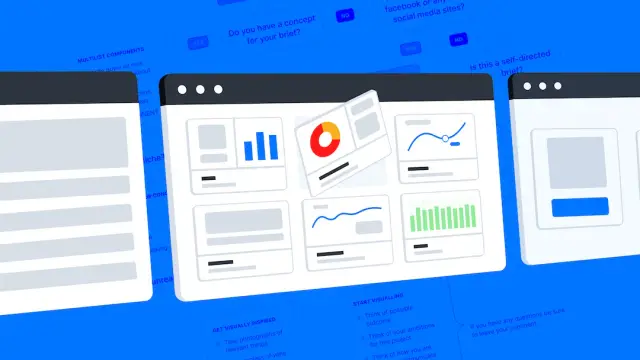How Do Web App Builders Ensure Data Protection?
Explore how web app builders and no-code development platforms ensure data protection, crucial steps for secure app development, and the role of GDPR and other regulations.

The Importance of Data Protection in Web App Development
Data protection is critical to web app development, as it helps maintain user trust and avoid potential data breaches, financial penalties, and reputational damage. Organizations need to ensure that their applications safeguard sensitive user data and prevent unauthorized access.
Web app developers are responsible for building and maintaining applications that adhere to data protection guidelines and industry standards. Without proper data protection measures, web apps can be vulnerable to various security risks, such as data breaches, hacking, unauthorized access, and other cyber attacks. These threats can result in serious consequences, including damage to brand reputation, litigation, and heavy financial penalties.
Moreover, regulatory authorities require organizations to adhere to data protection laws and regulations, such as the General Data Protection Regulation (GDPR) and the California Consumer Privacy Act (CCPA). Non-compliance can further lead to hefty fines and penalties.
Web App Builders and No-Code Platforms: Security by Design
Web app builders and no-code platforms are gaining popularity, as they enable users to build web applications quickly without the need to write code. These platforms can help save time and resources in the app development process, enabling non-programmers to create fully functional, bespoke applications.
At the same time, these benefits might raise concerns about the platform's ability to offer adequate data protection and privacy. Fortunately, modern web app builders and no-code platforms are increasingly focusing on security by design. They understand the importance of data protection and make it an integral aspect of the development process. These platforms ensure that the resulting applications are secure and compliant with relevant data protection regulations by including security features and privacy safeguards.
Moreover, no-code platforms often undergo rigorous security audits and testing processes to identify and rectify potential vulnerabilities. This continuous improvement approach further ensures that security features are up-to-date and adequate to tackle emerging threats and risks.

Measures to Ensure Data Protection and Privacy
Web app builders and no-code platforms adopt various measures to ensure data protection and privacy in the applications they help create. Some of these steps include:
- Encryption: No-code platforms ensure data is encrypted at rest and in transit. By using strong encryption algorithms, they protect sensitive user data from unauthorized access and potential security threats.
- Secure Storage: Proper data storage is crucial for protecting user information. Platforms store user data securely and provide secure backups to prevent data loss in case of a system failure or other disruptions.
- Access Control and Authentication: Web app builders provide features for implementing access control and authentication mechanisms in their applications. This includes multi-factor authentication (MFA), single sign-on (SSO), and role-based access control (RBAC).
- Secure API Design: API security is a critical aspect of data protection in web applications. No-code platforms offer powerful API design and management tools that ensure secure and controlled access to potential integrations.
- Built-in Security Features: Many web app builders have built-in security features, such as secure password hashing, input validation, and protection against common web application attacks like cross-site scripting (XSS) and SQL injection. These built-in protections help reduce the risk of vulnerabilities during the development process.
- Regulatory Compliance: Web app builders must comply with data protection regulations like GDPR and CCPA. By doing so, they ensure that the applications built using their platform align with legal requirements and maintain user privacy.
These measures allow web app builders and no-code platforms to create secure, privacy-focused applications that meet industry standards and regulatory requirements. This builds user trust and helps organizations stay compliant and avoid potential security risks.
Roles of GDPR, CCPA, and Other Regulations
Data protection and privacy have become increasingly important in recent years due to the substantial amounts of personal information stored and processed online. Various regulations have been introduced globally to protect individuals' rights to privacy. Web app builders should pay close attention to these regulations while developing applications, as failing to comply can result in severe financial penalties and reputational damage. Here, we will discuss two key regulations that have significantly impacted the no-code and web app builder sphere: the General Data Protection Regulation (GDPR) and the California Consumer Privacy Act (CCPA).
General Data Protection Regulation (GDPR)
The GDPR is a comprehensive data protection regulation that governs the processing of personal data for individuals within the European Union (EU) and European Economic Area (EEA). Introduced in 2018, GDPR aims to give people more control over their personal data and requires businesses, including web app builders, to adhere to strict guidelines in its handling, processing, and storage. Some of the critical GDPR principles for web app builders are:
- Lawful, fair, and transparent processing: Personal data must be processed lawfully, fairly, and transparently. Web app developers should provide clear information to users about how their data is being collected, used, and processed.
- Purpose limitation: Personal data should be collected for specified, explicit, and legitimate purposes only. It should not be further processed in a way that is incompatible with those purposes.
- Data minimization: Personal data must be adequate, relevant, and limited to what is necessary concerning the purposes for which they are processed.
- Accuracy: Personal data must be accurate, up-to-date, and rectified without delay if found to be inaccurate.
- Storage limitation: Personal data should be kept in a form that permits identification of data subjects for no longer than necessary for the purposes for which the data is being processed.
- Confidentiality and integrity: Personal data should be protected from unauthorized or unlawful processing, accidental loss, destruction, or damage by taking appropriate technical and organizational measures.
One of the most significant requirements of GDPR is obtaining clear and explicit consent from users before collecting, processing, or sharing their personal data. Therefore, web app builders must adopt efficient methods for managing user consent, such as displaying a cookie consent banner or implementing a dedicated consent management platform.
Fines for non-compliance can be significant, up to 4% of a company's annual global turnover or €20 million, whichever is higher, along with potential damage to the company's reputation. Consequently, web app builders must prioritize GDPR compliance when developing their applications.
California Consumer Privacy Act (CCPA)
The CCPA is a data privacy law that aims to protect the personal information of California residents. It emerged in 2020 and shares similarities with GDPR, imposing specific obligations on businesses that collect, process, or sell California consumers' personal data. Key CCPA provisions for web app builders include:
- Transparency: Businesses must disclose the categories of personal information collected, the purpose for its collection, and whether it is sold or shared with third parties.
- Right to access: Consumers have the right to request access to their personal information, including the origins of the data, the categories of third parties with whom it has been shared, and the purpose for which it has been used.
- Right to deletion: Consumers have the right to request the deletion of their personal information, with some exceptions.
- Right to opt-out: Consumers can opt-out of the sale of their personal information to third parties, and businesses must provide a clear and accessible "Do Not Sell My Personal Information" link on their website or application.
- Non-discrimination: Businesses cannot discriminate against consumers who exercise their rights under the CCPA, such as charging a different price or providing a lower quality service.
Although the CCPA primarily targets California residents, it has a worldwide impact on businesses, including web app builders, that have customers or users in California. Failure to comply with the CCPA can result in civil penalties of up to $7,500 per violation and potential damage to a company’s reputation. Thus, web app builders must consider these regulations when developing their applications to ensure compliance and protect user data.
AppMaster: A No-Code Platform with Privacy and Data Protection in Focus
AppMaster is a powerful no-code platform designed to build backend, web, and mobile applications with a strong focus on data protection and privacy. With its powerful suite of features and tools, AppMaster enables professional developers and non-technical users to create secure applications quickly and efficiently while adhering to regulatory requirements such as GDPR and CCPA. Some of the key features of AppMaster that ensure data protection and privacy are:
- Secure Storage: Data is stored securely in Postgresql-compatible databases and can be encrypted at rest, ensuring the safety of sensitive information.
- API Design: Automatically generated APIs have built-in security features, including authentication, rate limiting, and input validation, to protect against common security threats.
- Access Control and Role-based Security: AppMaster enables developers to define roles with granular permissions and apply them to users or groups, ensuring that only authorized personnel can access sensitive data and features.
- Data Encryption: Data transmitted between the client and the server is encrypted using industry-standard encryption protocols, safeguarding sensitive personal data from interception.
- Compliance with Regulations: AppMaster helps businesses comply with GDPR, CCPA, and other data protection regulations by providing features that facilitate obtaining user consent, managing user rights, and adhering to data processing principles.

By utilizing a no-code platform like AppMaster, businesses can significantly speed up application development without compromising data protection, supporting compliance with regulatory requirements, and promoting user trust in the applications they create.
Developers must prioritize data protection and privacy when working with web app builders and no-code development platforms. By staying up-to-date on applicable regulations and best practices, and leveraging platforms like AppMaster, developers can create secure and compliant applications that drive success and protect users' personal information in today's digital world.
FAQ
Web app builders adopt various measures like encryption, secure storage, secure API design, and multi-factor authentication to ensure data protection and privacy.
The GDPR regulates the processing of personal data in the European Union and requires web app builders to adhere to strict guidelines, ensuring privacy and data protection for users.
Data protection in web app development is vital to maintaining user trust and avoiding data breaches, financial penalties, and reputational damage.
No-code platforms ensure security and privacy by implementing measures like encryption, access control, compliance with regulations, and built-in security features.
Using a no-code platform with built-in data protection features ensures compliance with regulations, reduces the risk of data breaches, and enhances user trust in the developed applications.
AppMaster follows best practices like secure storage, access control, encryption, and robust API design to maintain data protection and privacy for its users.





